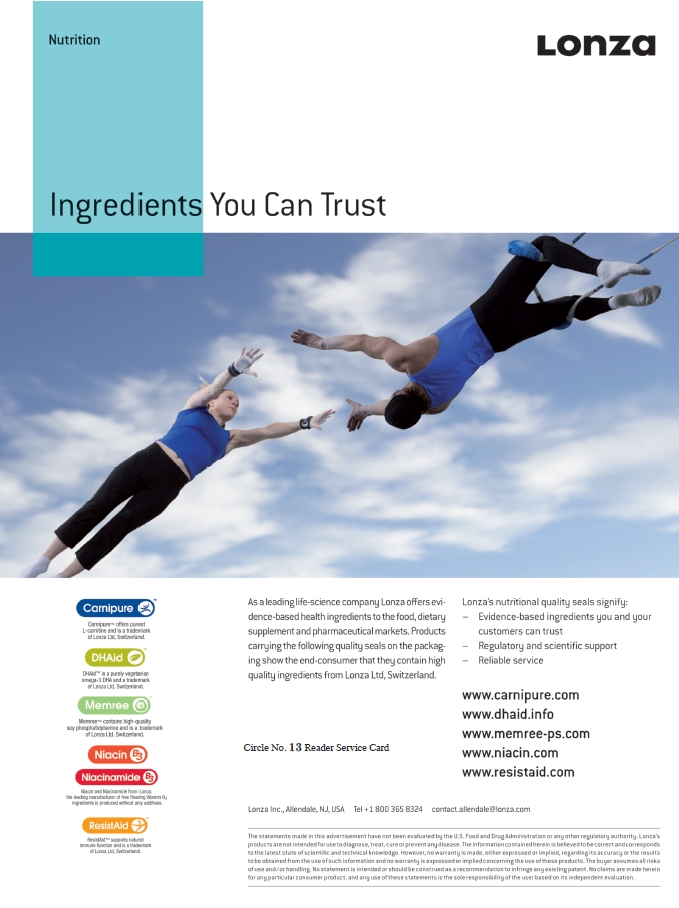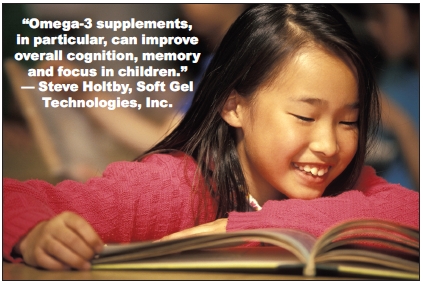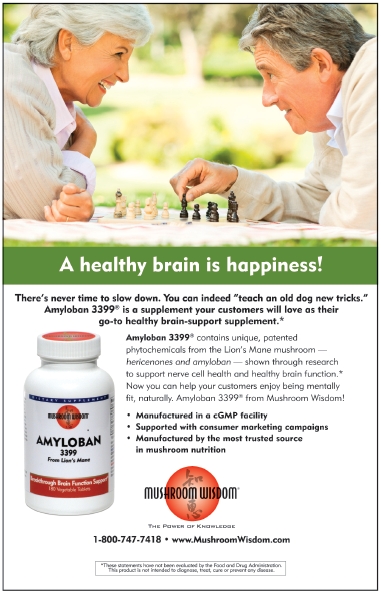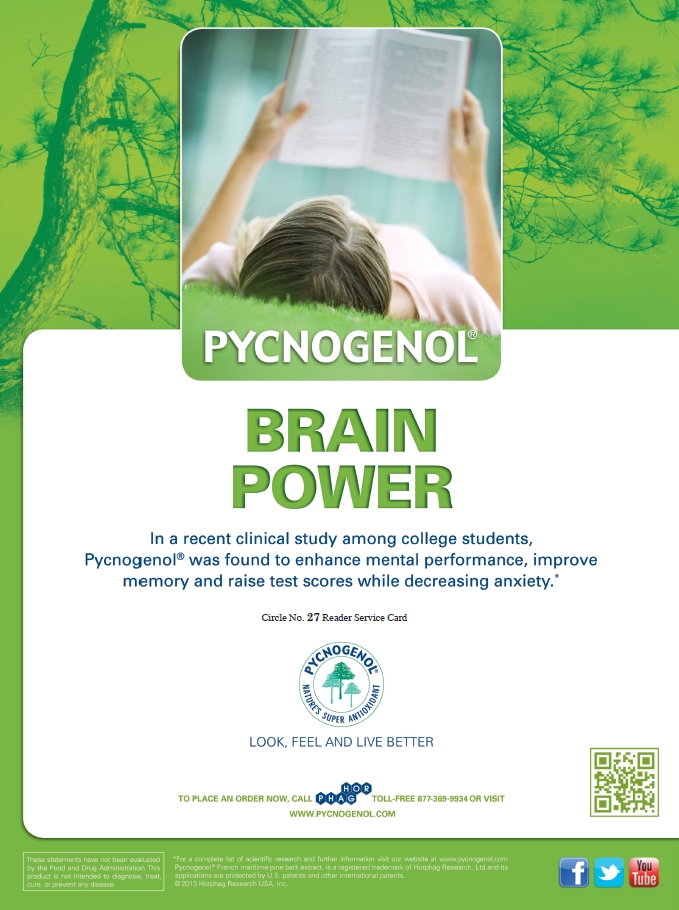For those looking to focus, reduce stress, elevate mood, improve memory or stave off cognitive decline, brain support supplements fit the bill. Except for those happy, stress-free Einsteins out there who don’t require any help, these categories of cognitive need include almost everyone.
Selling Brain Health
Though brain supplements can provide support to people of any age, this category has largely been driven by the concerns and purchases of those middle aged and older. Traditionally, says Yael Glickman, Ph.D., brain health category manager at Enzymotec Ltd., Migdal HaEmeq, Israel, brain/mood products have been used by seniors experiencing some weakening of their cognitive abilities.
The same concerns have also created demand from a slightly younger set. “Many Baby Boomers have parents who have been diagnosed with dementia and Alzheimer’s disease; as a consequence, they want to avoid the pitfalls associated with it,” says Chase Hagerman, business development and marketing manager at Chemi Nutra, White Bear Lake, MN. Evidence shows that Boomers take brain supplements to maintain mental sharpness, decrease stress and support a healthy mood, according to Gene Bruno, M.S., MHS, director of category management for Twinlab Corporation, New York, NY.
For Dallas Clouatre, Ph.D., consultant for R&D to Jarrow Formulas, Inc., Los Angeles, CA, those at the mid-point of life and later make up one of at least four distinct groups that can benefit from brain support. The others are children and teenagers, college-aged individuals and expectant mothers. Clouatre says that while one might think mothers would represent significant sales, in practice, the market is propelled mostly by children and teenagers and older people. “The greatest sales volume in the category, without a doubt, goes to the enlarging category of the aging over 45 and those approaching retirement,” he says.
The prenatal segment is still an important one,  according to Glickman, but along with brain supplement sales from older people, she says that not much growth has occurred in recent years. She believes future growth may come from the poorly served group of children and toddlers, who face an urgent need to support cognitive and mental performance.
according to Glickman, but along with brain supplement sales from older people, she says that not much growth has occurred in recent years. She believes future growth may come from the poorly served group of children and toddlers, who face an urgent need to support cognitive and mental performance.
Certain subpopulations quite often take these supplements for similar reasons. “We have seen an increase among a younger demographic, especially students who are looking to improve focus,” says Sébastien Bornet, director of global marketing at Horphag Research (worldwide exclusive supplier of Pycnogenol), Hoboken, NJ. Bruno adds that this desire for improved memory, focus and concentration among students is helping to move the market forward.
“Stress-reducing supplements seem to be more popular among women. Stress is known to have a greater impact on women’s health and is associated with various health risks such as heart disease, cancer risk, depression, depressed immune function, weight gain and low libido,” says Sherry Torkos, pharmacist, author of The Canadian Encyclopedia of Natural Medicine, and advisor to Taiyo International, Minneapolis, MN.
But ultimately, all spectrums of the consumer market are benefitting from brain supplements, says David Winston, RH (AHG), founder of Herbalist & Alchemist, Washington, NJ. This includes parents trying to help their children with ADHD, post-menopausal women looking to dispel brain fog, and the legions of overstressed and overworked who need some extra support. “This is really a product category that transcends any one group or any single gender,” Winston says.
Pharmaceuticals, supplements and growth. Though some recognize the need for prevention and maintenance, the general paradigm in our society is to wait for symptoms, diagnose and medicate appropriately. This, it would seem, is a limiting factor on the widespread adoption of natural brain health supplements, but many feel things are starting to change.
“We believe there is potential for tremendous growth in this category. Consumers are looking for natural and safe alternatives to medications and pharmaceuticals,” says Julie Thibeau, director of sales and marketing at NutriScience Innovations LLC, Trumbull, CT. Although many medications are quite effective, they are also often fraught with side effects that can actually outweigh their positive qualities, she says.
The medical/pharmaceutical model may still dominate, many people are growing unhappy with it, Winston believes. Many medications people take either aren’t working or have adverse effects, and he says that Western medicine has not yet produced good enough options for treating Alzheimer’s, dementia or age-related cognitive decline. So, he concludes, “I think that there is a tremendous potential for growth with herbs and supplements, especially those that have good research showing efficacy.”
 A base of people already prefer a natural, gentler approach over prescription drugs for brain and mood support, and the appeal of natural is growing, says Neil E. Levin, CCN, DANLA, nutrition education manager for NOW Foods, Bloomingdale, IL. “We do expect the number of people looking for solutions to continue to grow for at least another couple of decades, so this is a key area of research and development,” he says.
A base of people already prefer a natural, gentler approach over prescription drugs for brain and mood support, and the appeal of natural is growing, says Neil E. Levin, CCN, DANLA, nutrition education manager for NOW Foods, Bloomingdale, IL. “We do expect the number of people looking for solutions to continue to grow for at least another couple of decades, so this is a key area of research and development,” he says.
Though dietary supplements cannot be said to treat disease, Hagerman notes that important parallels exist between the drug model and the supplement space. He says his company’s alpha-glyceryl phosphoryl choline (A-GPC) ingredient (AlphaSize) is sold by its Italian parent company as an injectable and oral drug for Alzheimer’s disease, dementia, stroke, coma, brain injury and other conditions. In Europe and Asia, it competes against the leading acetylcholinesterase inhibitor, and numerous studies show it works at least as well. In the United States, it is marketed in accordance with dietary supplement regulations and is generally recognized as safe (GRAS) for use in food.
While desire to avoid needing pharmaceutical and medical treatment influences people toward dietary supplement use, Hagerman also emphasizes the many brain supplements that go beyond maintenance to tout brain boosting benefits. Such benefits, including mental clarity, enhanced memory and increased mental energy, are appealing to a wide group of people.
Bridging the brain health gap. Though brain health is emerging as one of the most promising categories in nutrition, Bruno explains that it must overcome a current disconnect. “Compared with other supplement categories, such as heart health and joint health, brain supplement sales are underdeveloped despite significant concern and demand from consumers,” he says. So what gives? And how can people’s concerns be turned toward the adoption of supplements?
Part of the problem, Clouatre feels, is conceptual. Cognitive support supplements are in one sense “condition specific,” but they differ from an area like joint health which has definite markers, like range of motion and pain, for consumers to track. “Quick and easily recognizable responses in this area are more likely to be associated with, say, caffeine and other ‘energy’ supplements for a quick ‘pick me up’ and mood elevation,” says Clouatre.
Torkos agrees that brain support supplements often take time to work, and results can be hard to assess. Another issue, she says, is consumer awareness. When someone has depression, their doctor most often simply prescribes an antidepressant or sedative, and the person may not be aware of the supplement options available for mood support.
“We should help consumers become more informed,” says  Steve Holtby, president and CEO of Soft Gel Technologies, Inc., Los Angeles, CA. “The message commonly held by consumers that brain cells just naturally die as you get older and memory loss, dementia and senility are natural to getting old needs to be debunked.” This notion, he says, should be replaced with the knowledge that paying attention to what one eats can help keep the brain functioning optimally.
Steve Holtby, president and CEO of Soft Gel Technologies, Inc., Los Angeles, CA. “The message commonly held by consumers that brain cells just naturally die as you get older and memory loss, dementia and senility are natural to getting old needs to be debunked.” This notion, he says, should be replaced with the knowledge that paying attention to what one eats can help keep the brain functioning optimally.
Cheryl Myers, chief of education and scientific affairs at EuroPharma, Inc., Green Bay, WI, also thinks some re-education is in order. “I’d like to see more emphasis on the fact that brain and mood health concerns are largely due to inflammation, and aren’t just chemical imbalances,” she says, citing the cognitive benefits of curcumin as evidence of this effect.
Positive strides are being made in some areas. “With ingredients such as 5-HTP, consumer awareness is growing and consumers who are looking for natural alternatives for mood support are understanding its benefits,” says Lisa Sheppard, vice president of marketing, Natrol, Chatsworth, CA.
Clearly demand is rising. Though it still accounts for a small slice of the overall supplement market, dozens of new brain health products, including foods and beverages, are being introduced every few months, according to Bruno.
The future growth of the category hinges on several potential factors, Glickman says. “Those include: science, delivery systems, presence of a large multi-national corporation and finally new population segments,” she says.
Science will continue to boost the category as strong clinical evidence from top research institutions helps increase consumer confidence. As for delivery systems, Glickman thinks that this area will soon help bridge the gap between consumer concern and demand. The number of solutions currently offered and the prices at which they are available need to improve, and this can be accomplished if supplement manufacturers put more emphasis on adequate and compelling delivery systems. Gummies and liquid shots are examples of areas to be innovated, she says.
As was the case for probiotics or DHA in infant formulas, the entrance of a large multi-national player into this market and the launch of a brand that will create significant awareness could be a key step for growth. Lastly, Glickman says that the addition of other age groups with different needs to the brain health market is important. Children and toddlers, she explains, now often deal with a very competitive academic environment, and parents are looking to support their performance.
Brain Claims
Regulations bar dietary supplement marketers from saying that supplements benefit disease states. In the brain health category, several strategies can be used that both convey the intended benefit and steer clear of anything related to disease.
For instance, Clouatre points out that it is relatively easy for supplement marketers to recast “depression,” a disease state, in terms of mood and energy. The concept of mood itself is highly subjective.
“There is ample evidence-based support for making memory and mood claims with a number of dietary supplement ingredients in this area, without needing to stretch the envelope,” says Parris Kidd, Ph.D., chief science officer for Doctor’s Best Inc., San Clemente, CA.
He points to one of his company’s products, which makes memory and other cognitive support claims based on numerous published, peer-reviewed clinical trials that validated such benefits. “Clinical assessments of memory, mood and other cognitive functions lend themselves to being structure/function claims because they are most often measured structurally and functionally in controlled clinical trials,” says Kidd.
 Speaking on his own behalf, Bruno agrees that appropriate structure/function claims can be made in this category assuming scientific support is there for the claims. The nutraceuticals being used in the products must also be the same used in the supportive research, in the same clinically relevant amounts. He also emphasizes the importance of avoiding claims involving disease states, most prominently Alzheimer’s in this category. Bruno says, “I think that retailers and consumers in the health and natural food space tend to understand that regulations dictate claims be limited to relatively soft statements such as ‘supports cognitive function’ or ‘supports mood.’”
Speaking on his own behalf, Bruno agrees that appropriate structure/function claims can be made in this category assuming scientific support is there for the claims. The nutraceuticals being used in the products must also be the same used in the supportive research, in the same clinically relevant amounts. He also emphasizes the importance of avoiding claims involving disease states, most prominently Alzheimer’s in this category. Bruno says, “I think that retailers and consumers in the health and natural food space tend to understand that regulations dictate claims be limited to relatively soft statements such as ‘supports cognitive function’ or ‘supports mood.’”
Levin offers several other phrases that are used to convey structure/function benefits, including “supports memory, learning and alertness,” “crosses the blood/brain barrier” and “promotes brain health.”
One supplement in this category has been bestowed a qualified health claim by the U.S. Food and Drug Administration (FDA). Bruno tells us that phosphatidylserine (PS) products can carry the following message: “Consumption of phosphatidylserine may reduce the risk of dementia in the elderly. Very limited and preliminary scientific research suggests that phosphatidylserine may reduce the risk of dementia in the elderly. FDA concludes that there is little scientific evidence supporting this claim.” They can also use the same message with the word dementia replaced by “cognitive dysfunction.”
Bruno expresses the opinion that these qualified claims have limited appeal in practical terms. Even if additional supplements in this category were granted qualified claims, there is no reason to think companies would use them often.
“As we see, the lengthy disclaimers tend to negate the value of these hard-won claims,” Levin says, adding that it is doubtful other supplements will gain even this level of approval by FDA, unless a substantial body of scientific evidence is developed that forces the agency to acknowledge some benefit.
Clouatre says there are steps in place to lobby for new health claims, but it can take a long time and the outcome is never certain. Also important to keep in mind is that while PS products can use this claim, according to Clouatre, they cannot suggest a level of PS intake for achieving the claimed effect. Doing so could cause FDA to view it as a disease treatment claim.
Instead of using such highly qualified claims, manufacturers have used relatively “safe” structure/function claims instead, says Glickman. She adds that the brain health segment, as a whole, does not seem to aggressively promote benefits to consumers, and this may partly account for the modest size of the market.
Other nutrients are deserving of approved health claims in recognition of their brain health benefits, Kidd believes. Omega-3 DHA is one, he says, stating, “There is abundant clinical evidence in support of higher-level claims for DHA related to memory and mood.” Taurine (l-taurine) is another suggestion, as Kidd says it has been deemed essential for early brain, heart and eye development and is included in infant formulas. Good infant formulas also include carnitine (l-carnitine), which is needed for energy production and fat metabolism in the brain and other organs, he says.
Myers believes the industry would like to see more claims approved, but she says that education is necessary. Evidence that supplements like omega-3s, phospholipids and peptides and high-absorption curcumin can make a difference must be responsibly presented, she says.
Champions of Cognition
Consumer awareness of certain brain health supplements may be relatively low. So, with that in mind, let’s break down some of the essential options and look at some recent evidence for their effectiveness.
PS, already discussed for its qualified health claim, is widely cited for its potential to impact brain health positively. “Since PS has been researched among multiple age ranges, I believe it is one nutraceutical that has broad application as a brain health nutrient for many people,” says Bruno.
PS is one of Kidd’s favorites, owing to both the clinical trials it has behind it and our level of understanding of how it works. He says it is an essential building block for cell membranes, and is especially concentrated at brain synapses.
It is a fat-soluble phospholipid that occurs endogenously in humans, and is the most abundant phospholipid in the brain, according to Bruno. He says it is important in neuronal membrane functions including the maintenance of the cell’s internal environment, signal transduction, secretory vesicle release, cell-to-cell communication and the regulation of cell growth. Hagerman further explains that in managing the cell’s environment, PS assists the entry of nutrients into cells and the exit of harmful, stress-related waste products. PS, he says, also assists proteins that manage membrane functions.
Among the many studies on PS use in adults and older adults, Bruno cites one in particular that showed use of 100 mg of PS daily for 20 days by 120 students was more effective than placebo at supporting cognitive function and memory (1). Another study, cited by Glickman, also used 100 mg of a branded PS ingredient (Sharp PS from Enzymotec). Researchers found that PS consumption may be associated with improving or maintaining cognitive status in elderly subjects with memory complaints (2).
In addition, Clouatre says, “PS protects against stress by mitigating the actions of cortisol.” Research into PS is a very active area, concerning PS both as a standalone compound and in combination with others. One new study Clouatre shares examined the cognitive effects of a supplement made from extract of Bacopa monnieri, astaxanthin, PS and vitamin E. The subjects had mild cognitive impairment, and after supplementation ended, the researchers concluded that the combination had potential in counteracting this level of impairment (3).
The last element of that combination, vitamin E, is a potent anti-inflammatory with various links to brain health. According to one study provided by Carotech Inc., Edison, NJ, the tocotrienol forms of vitamin E may have neuroprotective effects. In the study, published in the journal Stroke, researchers found that a palm-derived mixed tocotrienol complex (Tocomin SupraBio from Carotech) slowed the progression of white matter lesions (WMLs) in humans. WMLs, which are indicators of future stroke risk, were measured using MRIs at baseline, one year and two years of supplementation. Those who received the vitamin E saw their WML volume go unchanged after two years whereas they increased in the others (4).
Another study cited by Carotech found that low blood serum levels of vitamin E tocopherols and toctrienols were associated with a higher risk of cognitive impairment in older adults. 140 elderly Finnish, who were free from cognitive impairment at the start of the study, had their status examined eight years later. The risk of cognitive impairment was found to be lower in subjects with higher levels of gamma-tocopherol, beta-tocotrienol and total tocotrienols (5).
PS is related to omega-3 DHA, which also has powerful implications for the brain. “PS is in fact a DHA carrier in our brain, and some evidence seems to suggest that there is a synergistic effect resulting from the association of PS and DHA in the brain,” says Glickman.
Like PS, Kidd says DHA is also concentrated at the brain synapses and is an essential building block for cell membranes. “DHA is needed to build pliable brain cell structures that can easily communicate with the billions of other brain cells,” Holtby explains.
Because the body is not efficient at making DHA, it is a vitamin-like nutrient for humans and most of the needed supply must come from diet, Kidd says. During pregnancy, adequate DHA intake is required for the development of the baby’s brain and heart. He says that surveys show American women of reproductive age often have DHA intakes far lower than what is recommended for a healthy pregnancy.
General omega-3 supplementation should start while women are pregnant, Holtby says, as both omega-3 DHA and EPA are critical to the development of the baby’s brain and nervous system. They are also important in childhood. “Omega-3 supplements, in particular, can improve overall cognition, memory and focus in children and even reduce symptoms that come with common childhood conditions like asthma, eczema and ADHD,” he says.
Sheppard points to a recent review that looks at the effects of omega-3s on the brain health of women. Those who took part in the Women’s Health Initiative Memory Study were found to have larger total brain and hippocampus volume the higher the omega-3 DHA and EPA content in their red blood cells (6).
Magnesium is also an essential nutrient for brain function, and Levin describes a patented form (Magnesium L-Threonate) that can easily cross the blood-brain barrier for utilization by the brain. Studies indicate it may help support learning and memory along with a relaxed mood. Levin adds that magnesium is thought to be critical for normal cognitive function, as it helps maintain the density and stability of neuronal synapses.
Levin also describes a product that combines huperzine A with alpha-GPC to promote acetylcholine (ACh) production and keep ACh levels in the brain elevated. ACh is a neurotransmitter necessary for cognitive function, but the body produces less as we age. The intended result is support for mental alertness and learning. “A recent review article showed that Huperzine A could have significant effects on brain health and function, partly by regulating iron in the brain for neuroprotective effects,” Levin says (7).
Alpha-GPC converts in the body to a metabolically active form of choline called phosphatidylcholine (PC), according to Hagerman. PC moves to synaptic nerve endings and increases the release of ACh. “Acetylcholine plays a role in nearly every cognitive function,” Hagerman says.
Evidence supports the use of S-adenosyl-methionine (SAMe) for brain health and mood, according to Clouatre. One unique study, he says, looked at individuals with major depression already being treated with serotonin reuptake inhibitors. It was found that supplementing with SAMe improved the percentage who benefited from treatment (8).
Torkos points to vinpocetine as a vital brain health nutrient. “Research suggests it can improve memory and mental function in those with mild to moderate dementia and Alzheimer’s disease,” she says.
|
Brain/Mood Products
Carotech: Tocomin, Tocomin Suprabio. Chemi Nutra: AlphaSize Alpha-Glyceryl Phosphoryl Choline (A-GPC), SerinAid PhosphatidylSerine (PS). Doctor’s Best: Natural Brain Enhancers, Best PycnoBrain Complex Featuring Pycnogenol and Taurine, Best Ashwagandha Featuring Sensoril, Best Multiple, Best Vitamin D3, Best Vegan D3, Best DHA 500 from Calamari, Best Vegetarian DHA from Algae, Real Krill Enhanced with DHA and EPA, Best Fully Active Folate, SAMe 400, Quick Melt Fully Active B12, Best Brain Magnesium, Best Phosphatidylserine, Best Carnitine Energy, Best Taurine, Extra Strength Ginkgo. Enzymotec Ltd.: Sharp-PS, Soy-free and non-GMO Sharp-PS Green, PS/DHA conjugate Sharp-PS GOLD. EuroPharma, Inc.: CuraMed, Mental Advantage, Vectomega. Herbalist & Alchemist: Kid’s Calmpound Glycerite, Gentle-Man, Emotional Relief, Women’s Calmpound, Tension Relief, various simples (single herb tinctures). Horphag Research: Pycnogenol. Jarrow Formulas: Neuro Optimizer, BrainBoost, Alpha GPC, Citicoline, MaxDHA, Phosphatidylserine, Uridine, Acetyl-L-Carnitine Arginate and Alpha Lipoic Acid (ALA), PQQ, Vinpocetine. Natrol: BrainSpeed Memory, DHA 500 mg Super Strength, Gingko Biloba, Mood Positive 5-HTP. NOW Foods: NOW True Calm, Dopa Mucuna (Velvet Bean extract), NOW Brain Elevate, NOW RememBRAIN, NOW Magtein. NutriScience Innovations LLC: Suntheanine (exclusive distributor). Soft Gel Technologies, Inc.: Smart PS, encapsulated DHA, flaxseed oil, krill oil, essential fatty acid blends containing evening primrose, borage, flax and fish oil, EZ Mega 3. Taiyo International: Suntheanine. Twinlab Corp.: PS Gummies, Acetyl L-Carnitine, BioPQQ Microtabs. |
|
According to Torkos, a patented form of the amino acid L-theanine (Suntheanine from Taiyo International) has been linked with improved mental focus and clarity, stress reduction and better sleep quality.
“Poor sleep quality is a common problem among children diagnosed with ADHD. Lack of sleep can affect a child’s behavior and emotions as well as his ability to do well in school,” Thibeau says. A study on the effect of this L-theanine ingredient on sleep quality in boys with ADHD resulted in significantly higher sleep percentage and sleep efficiency scores (9). Importantly, Thibeau says it can increase the quality of sleep without extending its duration.
Sheppard says that L-theanine is often paired in supplements with other nutrients like B vitamins and 5-HTP to help enhance mood. “L-theanine and bacopa may be beneficial to people under mental stress such as college students. Other ingredients such as ginkgo biloba and huperzine are more useful after 50 years of age,” she says.
Wintson tells us that some herbs are classified as nootropics for their ability to enhance cognitive function and cerebral circulation and provide neuroprotection. Bacopa monnieri is a prime example due to its anti-anxiety and neuroprotective benefits, according to Winston. Another is Mimosa bark, which he says is a mood elevator that may help people with low-grade depression, PTSD and anxiety.
Herbs and herbal supplements, Winston stresses, are often more effective in combination. “When herbs are paired intelligently, you get a synergy of activity. This is a concept that’s long been recognized in herbal medicine,” he says. He gives bacopa as an example, as it is often used with other herbs like lavender or rosemary.
An antioxidant extract from French maritime pine bark (Pycnogenol from Horphag Research) has been shown to provide cognitive benefits for people across a wide range of ages, according to Bornet. In light of the growing interest from younger people in brain health supplements, a study cited by Bornet bears special relevance. A 100 mg dose of Pycnogenol per day over eight weeks was found to improve memory and test scores in college students, and to decrease test anxiety by 17% (10).
“In many studies, the benefits of Pycnogenol for cognitive function have been linked to the antioxidant properties of the natural extract and its ability to help the body fight free radicals and produce nitric oxide,” says Carolina Burki, director of product development for Horphag Research. In another study, this time on people aged 60–85, the extract was shown to improve numerical and spatial working memory using a computer test. Blood results, Burki notes, showed a significant decrease in F2-isoprostanes (which track oxidative stress levels) among those taking the extract (11).
Continuing the theme of linking stress and inflammation with cognitive health, Myers says that studies have found chemical stress responses from the hypothalamic-pituitary-adrenal (HPA) axis lead to the release of inflammatory cytokines. These, in turn, have a negative effect on brain function. “This is a much more complex set of factors than the previous ‘brain chemistry only’ model,” Myers says.
“Consider this recent clinical study of curcumin and individuals with major depressive disorder (MDD),” she adds. In a randomized, controlled trial, the efficacy and safety of a curcumin ingredient (BCM-95 from Dolcas Biotech) was compared with the prescription anti-depressive fluoxetine. The experimental group that used a combination of fluoxetine and curcumin had the highest percentage of positive responses, at 77.8%, based on the Hamilton Depression Rating Scale. The curcumin only and fluoxetine only groups scored almost the same (12).
Myers says the two conclusions to draw are that curcumin worked as well as fluoxetine from baseline to six weeks of the study, and that it did so without negative side effects sometimes associated with prescription antidepressants. WF
References
1. T. Yong, et al., “Research on Human Memory Enhancement by Phosphatidylserine Fortified Milk,” Chongqing Medicine 40(30) (2011).
2. V. Vakhapova, et al., “Phosphatidylserine Containing Omega-3 Fatty Acids May Improve Memory Abilities in Nondemented Elderly Individuals with Memory Complaints: Results from an Open-Label Extension Study,” Dement. Geriatr. Cogn. Disord. 38(1-2), 39-45 (2014).
3. D. Zanotta, S. Puricelli, G. Bonoldi, “Cognitive Effects of a Dietary Supplement Made from Extract of Bacopa monnieri, Astaxanthin, Phosphatidylserine, and Vitamin E in Subjects with Mild Cognitive Impairment: A Noncomparative, Exploratory Clinical Study,” Neuropsychiatr. Dis. Treat. 10, 225-30 (2014).
4. Y. Gopalan, et al., “Clinical Investigation of the Protective Effects of Palm Vitamin E Tocotrienols on Brain White Matter,” Stroke 45(5), 1422-8 (2014).
5. F. Mangialasche, et al., “Serum Levels of Vitamin E Forms and Risk of Cognitive Impairment in a Finnish Cohort of Older Adults,” Exp. Gerontol. 48(12), 1428-35 (2013).
6. J.V. Pottala, et al., “Higher RBC EPA + DHA Corresponds with Larger Total Brain and Hippocampal Volumes: WHIMS-MRI Study,” Neurology. 82(5), 435-42 (2014).
7. S.H. Xing, et al., “Huperzine A in the Treatment of Alzheimer's Disease and Vascular Dementia: A Meta-Analysis,” Evid. Based Complement. Alternat. Med. Epub Feb 3 2014.
8. G.I. Papakostas, “S-adenosyl Methionine (SAMe) Augmentation of Serotonin Reuptake Inhibitors for Antidepressant Nonresponders with Major Depressive Disorder: A Double-blind, Randomized Clinical Trial,” Am. J. Psychiatry. 167(8), 942-8 (2010).
9. M.R. Lyon, M.P. Kapoor, L.R. Juneja, “The Effects of L-theanine (Suntheanine) on Objective Sleep Quality in Boys with Attention Deficit Hyperactivity Disorder (ADHD): A Randomized, Double-blind, Placebo-controlled Clinical Trial,” Altern. Med. Rev. 16(4), 348-54 (2011).
10. R. Luzzi, et al., “Pycnogenol Supplementation Improves Cognitive Function, Attention and Mental Performance in Students,” Panminerva Med. 53(3 Suppl 1), 75–82 (2011).
11. J. Ryan, et al., “An Examination of the Effects of the Antioxidant Pycnogenol on Cognitive Performance, Serum Lipid Profile, Endocrinological and Oxidative Stress Biomarkers in an Elderly Population, J. Psychopharmacol. 22(5), 553-62 (2008).
12. J. Sanmukhani, et al., “Efficacy and Safety of Curcumin in Major Depressive Disorder: A Randomized Controlled Trial,” Phytother. Res. 28(4), 579-85 (2014).
Published in WholeFoods Magazine, July 2014










